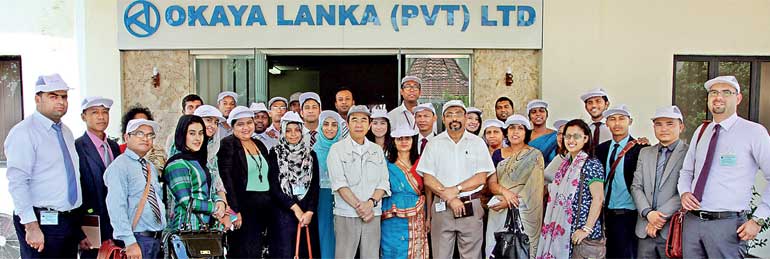Wednesday Feb 18, 2026
Wednesday Feb 18, 2026
Tuesday, 16 August 2016 00:16 - - {{hitsCtrl.values.hits}}
The Board of Investment of Sri Lanka recently hosted a delegation consisting of 26 foreign diplomats from 20 countries who are currently undergoing training at the Bandaranaike International Diplomatic Training Institute (BIDTI).
The group of diplomats were from Afghanistan, Bangladesh, Cambodia, Ethiopia, Fiji, Iran, Iraq, Kenya, Laos, Malaysia, the Maldives, Myanmar, Nepal, Pakistan, Palestine, Papua New Guinea, Seychelles, Tanzania, Thailand, Vietnam and Sri Lanka.
The group was led by BIDTI Director General Pamela Deen, who was assisted by several officers of the institute. The overseas diplomats are part of a program set up under the guidance of former Sri Lankan Foreign Minister, the late Lakshman Kadirgamar, who introduced the program in 1997 to build closer relations between Sri Lanka and other developing countries, with the objective of strengthening South-South international co-operation.
 The diplomats visited Okaya Lanka Ltd., a Japanese electronic factory at the Katunayake Export Processing Zone
The diplomats visited Okaya Lanka Ltd., a Japanese electronic factory at the Katunayake Export Processing Zone
BOI Chairman Upul Jayasuriya briefed the delegation on the role of the BOI, which was established in 1978. The Chairman described the important role of the organisation in opening up Sri Lanka’s economy to international trade and investment. Furthermore, Sri Lanka was the first country in the South Asian region to liberalise its economy, just after Singapore in South East Asia.
The first BOI zone had in fact opened shortly after the establishment of the Board and this was followed by the second zone in Biyagama. Chairman Jayasuriya added that the current Government was the same one that had been in power in 1978 and was very keen to fast track investment approval in Sri Lanka.
He stated that the BOI enjoyed many powers in the areas of immigration control, Inland Revenue, exchange control and Customs to facilitate the international investor community. Sri Lanka would have achieved considerable benefits had it not been for the conflict which erupted in 1983. However, the Chairman said that currently the BOI was looking at implementing improvements to fast track investment so that investors could focus on business rather than spending time in obtaining approval. He added that a new Constitution was being drafted in Sri Lanka and this would address the requirements of the investor community.
Currently, nearly 2,000 enterprises operate under the regime of the BOI from which only about 300 are actually located within the Export Processing Zones.
 BOI Chairman Upul Jayasuriya (centre) greets the delegation at the BOI head office
BOI Chairman Upul Jayasuriya (centre) greets the delegation at the BOI head office
Hence the mandate of the BOI has grown as well as the diversity of the investments. To conclude the Chairman stated that the BOI wanted to achieve a situation where “we are both pragmatic and practical”.
Deen added that Jiang Zemin, the former General Secretary of the Communist Party of China, had visited the BOI Zone at Katunayake in the early 1980s. This was many years before the Chinese economy was liberalised.
Assisting Chairman Jayasuriya were Executive Director (Promotion) Prasanjith Wijayathilake and Director (Media and Publicity) Dilip S. Samarasinghe. The delegation was shown the BOI corporate video and they were briefed on Sri Lanka’s investment climate by Samarasinghe.
Sri Lanka has been a pioneer in the field of Zone development but started to lag behind other nations during the conflict years. The BOI also arranged for the diplomats to visit the Katunayake Export Processing Zone where they were briefed on Zone Management by Director/Industrial Relations – KEPZ Himali Urugodawatte.
The diplomats also visited two enterprises located in the Katunayake Export Processing Zone namely Okaya Lanka Ltd., a Japanese electronics component manufacturer, and the MAS Shadowline Ltd. factory specialising in sportswear.
The visit by this delegation of diplomats to the BOI helped create a better understanding of Sri Lanka’s economic potential.